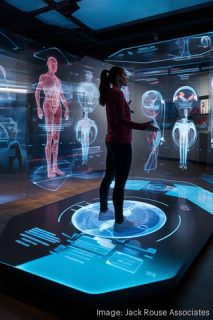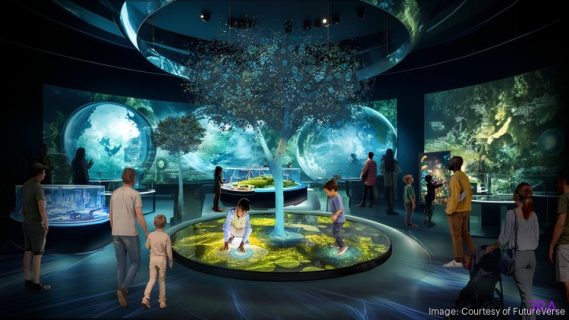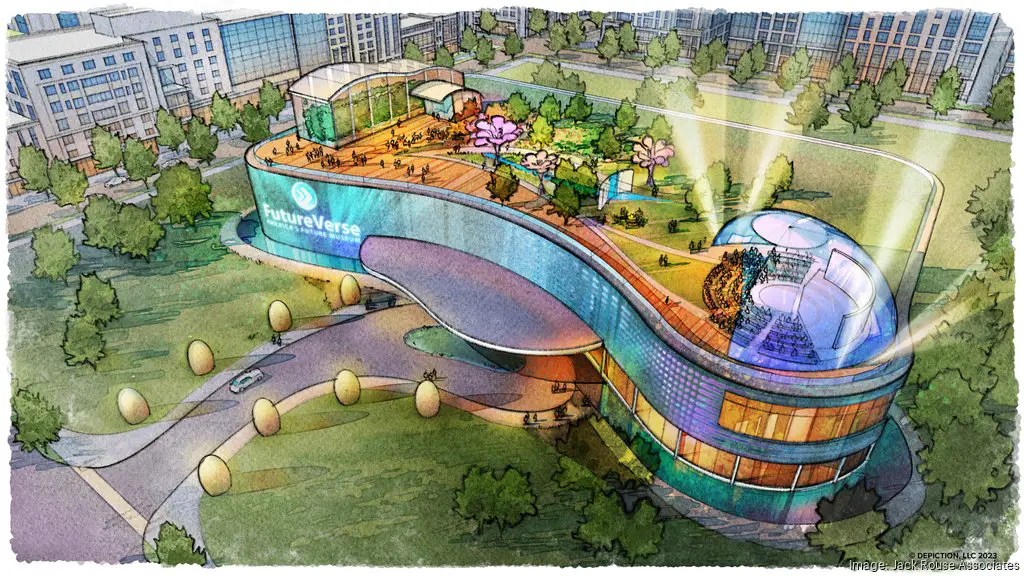What do you know about FutureVerse Museum? A cutting-edge museum in Atlanta that will showcase the future of space, robotics, and agriculture.
Imagine a museum showcasing the future of space exploration, the wonders of the human body, breakthroughs in robotics, and cutting-edge agricultural innovations.
This is the vision for a $100 million America’s Future Museum planned for Downtown Atlanta, Georgia, called FutureVerse.
“We’ll be building this with some of Georgia’s brightest minds,” said David Wynett, FutureVerse president and chief creative officer.
Wynett is an Atlanta local and UGA grad who previously work for Delta Air Lines and founded New York-based consulting firm Prodigy Works. He helped create products for clients such as The Coca-Cola Co., Nestlé S.A. and Procter & Gamble.
The FutureVerse museum is still in planning, and the team has raised about $250,000, Wynett said.
The team has not yet selected a site for the museum. But Atlanta Business Chronicle confirmed it has had early talks with Centennial Yards, the $5 billion redevelopment of The Gulch next to Mercedes-Benz Stadium. FutureVerse is working with Cushman & Wakefield, according to an announcement.
A.J. Robinson, president of Central Atlanta Progress, said in a prepared statement that FutureVerse will complement existing Downtown attractions.
“As Atlanta continues to be a top destination for people from across the globe, the proposed FutureVerse Museum will be a one-of-a-kind, immersive, educational experience,” Robinson said.
Read also:AIRBORNE ROBOTICS: manufacturer of high-performance and?heavy payload drones

Who is on board with the FutureVerse museum?
Georgia Tech and other universities are joining FutureVerse initiative.
FutureVerse museum has recruited top education and business leaders.
The board of advisors comprises Scott Boden, Emory Healthcare and Woodruff Health Science Center’s chief strategy officer; Bert Reeves, Georgia Tech’s vice president of institute relations; Nick Place, dean of UGA’s College of Agricultural and Environmental Sciences; Kyle Reis, Cooper Carry’s president and CEO; and Joel Bush, partner at Kilpatrick, Townsend & Stockton law firm.
“If we’re doing a museum about the future in Atlanta, it makes all the sense in the world for Georgia Tech to be heavily involved,” Reeves said in an interview. He discussed potential exhibits around sustainable buildings and Atlanta’s robust startup ecosystem.
Emory’s Boden sees the potential to inspire young people through the latest advancements in personalized medicine, robotics and artificial intelligence.
“Emory is backing and interested in the project, at the very least in an advisory capacity,” he said. “We’ve had some conversations about trying to be responsible for the design and content of the healthcare portion of the exhibit.”
And, Place in a statement said UGA aims to offer its expertise on agricultural and environmental innovation.
“Through FutureVerse, we anticipate sharing our research and endeavors, illustrating how we are not just feeding and fueling our world today, but paving the way for generations to come,” Place said.
Read also: Construction industry goes robotic

What is the FutureVerse museum anyway?
FutureVerse museum in Atlanta is a high-tech museum that aims to educate, inspire, and empower the next generation. The museum will span 150,000 square feet. It is projected to welcome about 1.2 million visitors a year, according to an announcement.
Who is the architect?
Cooper Carry is the architect for the museum. A rendering provided to the Chronicle shows a curved building with rooftop attractions, including a beautiful garden.
“It is a fascinating design challenge and opportunity,” Reis with Cooper Carry told the Chronicle in an email. “I have been intrigued by the caliber of creative people who have gotten behind it. It will be an incredible asset for Atlanta that will attract curious minds to explore the possibility of what our collective future holds.”
Inside, the FutureVerse museum would feature a total of six galleries connected to a large atrium, set up in a hub-and-spoke format like the Georgia Aquarium. It would also have an innovation lab, where visitors will be able to offer their solutions to pressing challenges.
“We are not just showing the future. We are helping to shape it, too,” Wynett said.
The galleries in FutureVerse would be focused on health, transportation, technology, art and film, gaming and the environment. The exhibits will showcase digital projection technologies.
“I see holographic projections showing the latest on the human body or space travel that will leave you breathless,” Wynett said. “We really want to transform the museum experience and increase attendance with these very immersive experiences.”
Read also: Different Ways Technology Is Changing The Construction Industry
